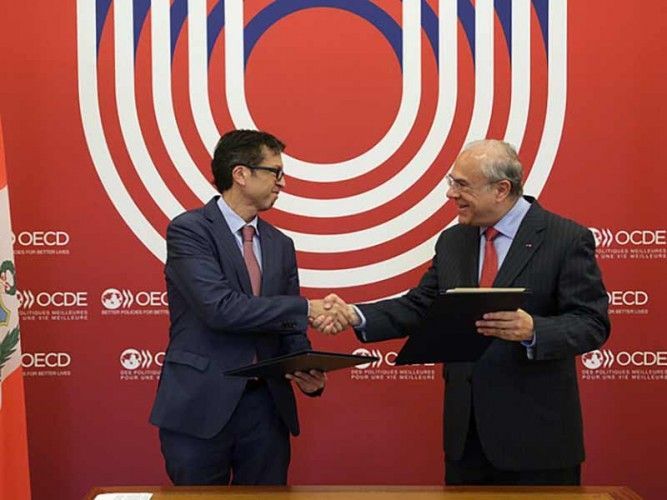Secretary-General Angel Gurria of the Organization for Economic Co-Operation and Development (OECD) and Peruvian Finance and Economy Minister David Tuesta met yesterday in Paris during a festive ceremony where they signed two major OECD Convention: the Convention on Combating Bribery of Foreign Public Officials in International Business Transactions (Anti-Bribery Convention) and the multilateral Convention on Mutual Administrative Assistance in Tax Matters.
With Peru’s signature under these two documents the country is taking an important step toward fighting corruption and facilitating a tax co-operation by fostering greater transparency and exchange of information to tackle tax evasion and avoidance.
Peru becomes the 44th party of the Anti-Bribery Convention
The OECD Anti-Bribery Convention, which entered into force in 1999 and since then was signed by all 35 OECD member countries plus Argentina, Brazil, Bulgaria, Colombia, Costa Rica, Lithuania, the Russian Federation and South Africa, prohibits the bribery of foreign public officials in international business transactions. Through country monitoring and extensive peer-led follow-up, the Convention seeks to ensure that the fight against bribery is effective, thus creating a level playing field for fair competition.
During the signing ceremony Mr. Gurria welcomed Peru as the 44th party, and 7th Latin American country, to join the OECD Anti-Bribery Convention. He stated that "by joining the Convention, Peru sends a clear signal that [the country] is determined to play a key role in the collective fight against cross-border bribery. This is another example of both Peru’s commitment to closer ties with the OECD, as well as its ability to adopt legal instruments in support of a fair and sustainable approach to globalization."
The Anti-Bribery Convention takes effect in Peru on July 27, 2018; so the country now has lots of work to do and will undergo systematic reviews on the implementation of its anti-bribery laws.
Peru signs OECD Multilateral Convention on Mutual Administrative Assistance in Tax Matters
During the same ceremony, Peruvian Minister of Finance and Economy David Tuesta signed the Multilateral Convention on Mutual Administrative Assistance in Tax Matters. With 119 countries and jurisdictions participating in the Convention, it is the world’s leading instrument for tax co-operation by boosting transparency and combating cross-border tax evasion and avoidance. The Convention will enter into force for Peru on September 1, 2018.
The Convention is the key instrument for the swift implementation of the Standard for Automatic Exchange of Financial Account Information in Tax Matters. The Standard - developed by the OECD and G20 countries – enables the participating countries to automatically exchange offshore financial account information. It is also a cornerstone for the implementation of the automatic exchange of country-by-country reports on the activities of multinational enterprises under the OECD/G20 Base Erosion and Profit Shifting (BEPS) Project and is a powerful tool in the fight against illicit financial flows.
Peru’s accession to the Anti-Bribery Convention and multilateral Convention on Mutual Administrative Assistance in Tax Matters is part of the country’s wider and continuing engagement with the OECD. This enhanced engagement, which has accelerated in the context of the OECD-Peru Country Program, has resulted in a significant increase of Peru’s participation in the Organization’s bodies and the adoption of OECD instruments.
Source: OECD


